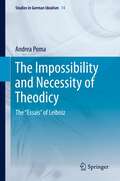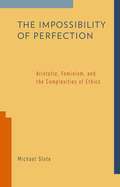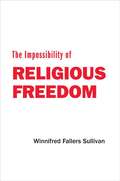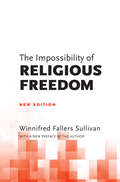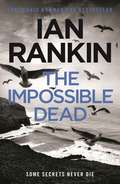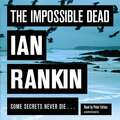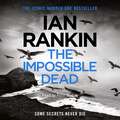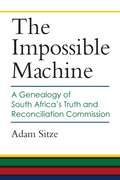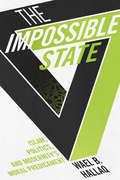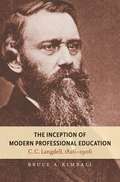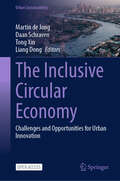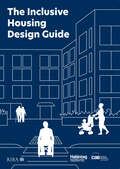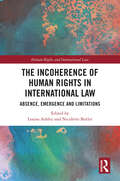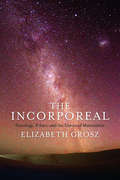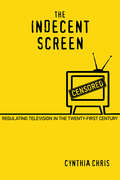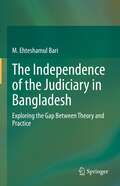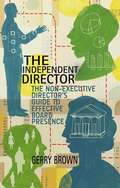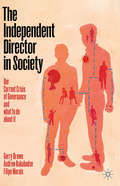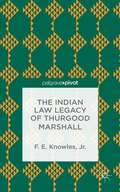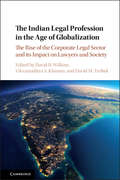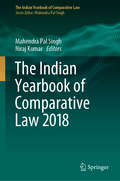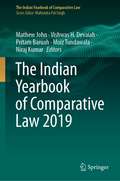- Table View
- List View
The Impossibility and Necessity of Theodicy
by Andrea PomaThis book provides an analytical interpretation of Leibniz's 'Essais de Théodicée' with wide-ranging references to all his works. It shows and upholds many thesis: Leibniz's rational conception of faith, his rational notion of mystery, the reformation of classical ontology, and the importance of Leibniz's thought in the tradition of the critical idealism. In his endeavor to formulate a theodicy, Leibniz emerges as a classic exponent of a non-immanentist modern rationalism, capable of engaging in a close dialogue with religion and faith. This relation implies that God and reason are directly involved in posing the challenge and that the defence of one is the defence of the other. Theodicy and logodicy are two key aspects of a philosophy which is open to faith and of a faith which is able to intervene in culture and history.
The Impossibility of Perfection: Aristotle, Feminism, and the Complexities of Ethics
by Michael SloteMost people think that the difficulty of balancing career and personal/family relationships is the fault of present-day society or is due to their own inadequacies. But in this major new book, eminent moral philosopher Michael Slote argues that the difficulty runs much deeper, that it is due to the essential nature of the divergent goods involved in this kind of choice. He shows more generally that perfect human happiness and perfect virtue are impossible in principle, a view originally enunciated by Isaiah Berlin, but much more thoroughly and synoptically defended here than ever before. <P><p> Ancient Greek and modern-day Enlightenment thought typically assumed that perfection was possible, and this is also true of Romanticism and of most recent ethical theory. But if, as Slote maintains, imperfection is inevitable, then our inherited categories of virtue and personal good are far too limited and unqualified to allow us to understand and cope with the richer and more complex life that characterizes today's world. And The Impossibility of Perfection argues in particular that we need some new notions, new distinctions, and even new philosophical methods in order to distill some of the ethical insights of recent feminist thought and arrive at a fuller and more realistic picture of ethical phenomena.
The Impossibility of Religious Freedom
by Winnifred Fallers SullivanThe Constitution may guarantee it. But religious freedom in America is, in fact, impossible. So argues this timely and iconoclastic work by law and religion scholar Winnifred Sullivan. Sullivan uses as the backdrop for the book the trial of Warner vs. Boca Raton, a recent case concerning the laws that protect the free exercise of religion in America. The trial, for which the author served as an expert witness, concerned regulations banning certain memorials from a multiconfessional nondenominational cemetery in Boca Raton, Florida. The book portrays the unsuccessful struggle of Catholic, Protestant, and Jewish families in Boca Raton to preserve the practice of placing such religious artifacts as crosses and stars of David on the graves of the city-owned burial ground. Sullivan demonstrates how, during the course of the proceeding, citizens from all walks of life and religious backgrounds were harassed to define just what their religion is. She argues that their plight points up a shocking truth: religion cannot be coherently defined for the purposes of American law, because everyone has different definitions of what religion is. Indeed, while religious freedom as a political idea was arguably once a force for tolerance, it has now become a force for intolerance, she maintains. A clear-eyed look at the laws created to protect religious freedom, this vigorously argued book offers a new take on a right deemed by many to be necessary for a free democratic society. It will have broad appeal not only for religion scholars, but also for anyone interested in law and the Constitution.
The Impossibility of Religious Freedom: New Edition
by Winnifred Fallers SullivanThe Constitution may guarantee it. But religious freedom in America is, in fact, impossible. So argues this timely and iconoclastic work by law and religion scholar Winnifred Sullivan. Sullivan uses as the backdrop for the book the trial of Warner vs. Boca Raton, a recent case concerning the laws that protect the free exercise of religion in America. The trial, for which the author served as an expert witness, concerned regulations banning certain memorials from a multiconfessional nondenominational cemetery in Boca Raton, Florida. The book portrays the unsuccessful struggle of Catholic, Protestant, and Jewish families in Boca Raton to preserve the practice of placing such religious artifacts as crosses and stars of David on the graves of the city-owned burial ground. Sullivan demonstrates how, during the course of the proceeding, citizens from all walks of life and religious backgrounds were harassed to define just what their religion is. She argues that their plight points up a shocking truth: religion cannot be coherently defined for the purposes of American law, because everyone has different definitions of what religion is. Indeed, while religious freedom as a political idea was arguably once a force for tolerance, it has now become a force for intolerance, she maintains. A clear-eyed look at the laws created to protect religious freedom, this vigorously argued book offers a new take on a right deemed by many to be necessary for a free democratic society. It will have broad appeal not only for religion scholars, but also for anyone interested in law and the Constitution.Featuring a new preface by the author, The Impossibility of Religious Freedom offers a new take on a right deemed by many to be necessary for a free democratic society.
The Impossible Dead
by Ian RankinMalcolm Fox returns in the stunning second novel in Ian Rankin's series... 'Criminally good' WOMAN & HOMEFrom the No.1 bestselling author of A SONG FOR THE DARK TIMES.'Excitingly gripping storytelling' THE TIMESMalcolm Fox and his team are back, investigating whether fellow cops covered up for Detective Paul Carter. Carter has been found guilty of misconduct, but what should be a simple job is soon complicated by a brutal murder and a weapon that should not even exist.A trail of revelations leads Fox back to 1985, a year of desperate unrest when letter-bombs and poisonous spores were sent to government offices, and kidnappings and murders were plotted. But while the body count rises the clock starts ticking, and a dramatic turn of events sees Fox in mortal danger.
The Impossible Dead
by Ian RankinMalcolm Fox returns in the stunning second novel in Ian Rankin's series... 'Criminally good' WOMAN & HOMEFrom the No.1 bestselling author of A SONG FOR THE DARK TIMES.'Excitingly gripping storytelling' THE TIMESMalcolm Fox and his team are back, investigating whether fellow cops covered up for Detective Paul Carter. Carter has been found guilty of misconduct, but what should be a simple job is soon complicated by a brutal murder and a weapon that should not even exist.A trail of revelations leads Fox back to 1985, a year of desperate unrest when letter-bombs and poisonous spores were sent to government offices, and kidnappings and murders were plotted. But while the body count rises the clock starts ticking, and a dramatic turn of events sees Fox in mortal danger.
The Impossible Dead: From the Iconic #1 Bestselling Writer of Channel 4’s MURDER ISLAND
by Ian RankinMalcolm Fox and his team are back, investigating whether fellow cops covered up for Detective Paul Carter. Carter has been found guilty of misconduct, but what should be a simple job is soon complicated by a brutal murder and a weapon that should not even exist.A trail of revelations leads Fox back to 1985, a year of desperate unrest when letter-bombs and poisonous spores were sent to government offices, and kidnappings and murders were plotted. But while the body count rises the clock starts ticking, and a dramatic turn of events sees Fox in mortal danger.Read by Peter Forbes(p) 2011 Orion Publishing Group
The Impossible Dead: From the iconic #1 bestselling author of A SONG FOR THE DARK TIMES
by Ian RankinMalcolm Fox and his team are back, investigating whether fellow cops covered up for Detective Paul Carter. Carter has been found guilty of misconduct, but what should be a simple job is soon complicated by a brutal murder and a weapon that should not even exist.A trail of revelations leads Fox back to 1985, a year of desperate unrest when letter-bombs and poisonous spores were sent to government offices, and kidnappings and murders were plotted. But while the body count rises the clock starts ticking, and a dramatic turn of events sees Fox in mortal danger.Read by Peter Forbes(p) 2011 Orion Publishing Group
The Impossible Machine: A Genealogy of South Africa's Truth and Reconciliation Commission
by Adam SitzeAdam Sitze meticulously traces the origins of South Africa's Truth and Reconciliation Commission back to two well-established instruments of colonial and imperial governance: the jurisprudence of indemnity and the commission of inquiry. This genealogy provides a fresh, though counterintuitive, understanding of the TRC's legal, political, and cultural importance. The TRC's genius, Sitze contends, is not the substitution of "forgiving" restorative justice for "strict" legal justice but rather the innovative adaptation of colonial law, sovereignty, and government. However, this approach also contains a potential liability: if the TRC's origins are forgotten, the very enterprise intended to overturn the jurisprudence of colonial rule may perpetuate it. In sum, Sitze proposes a provocative new means by which South Africa's Truth and Reconciliation Commission should be understood and evaluated.
The Impossible State
by Wael B. HallaqWael B. Hallaq boldly argues that the "Islamic state," judged by any standard definition of what the modern state represents, is both an impossible and inherently self-contradictory concept. Comparing the legal, political, moral, and constitutional histories of pre-modern Islam and Euro-America, he finds the adoption and practice of the modern state to be highly problematic for modern Muslims. He then conducts a more expansive critique of modernity's moral predicament, which renders impossible any project resting solely on ethical foundations.The modern state not only suffers from serious legal, political, and constitutional issues, Hallaq argues, but it also, by its very nature, fashions a subject inconsistent with what it means to be, or to live as, a Muslim. By Islamic standards, the state's technologies of the self are severely lacking in moral substance, and the Muslim state, as Hallaq shows, has done little to advance an acceptable form of genuine Shari'a governance. The Islamists' constitutional battles in Egypt and Pakistan, the Islamic legal and political failures of the Iranian Revolution, and similar disappointments underscore this fact. Nevertheless, the state remains the favored template of the Islamists and the ulama (Muslim clergymen). Providing Muslims with a path toward realizing the good life, Hallaq turns to the rich moral resources of Islamic history. Along the way, he proves political and other "crises of Islam" are not unique to the Islamic world nor to the Muslim religion. These crises are integral to the modern condition of both East and West, and recognizing such parallels enables Muslims to engage more productively with their Western counterparts.
The Impossible State: Islam, Politics, and Modernity's Moral Predicament
by Wael HallaqWael B. Hallaq boldly argues that the "Islamic state," judged by any standard definition of what the modern state represents, is both impossible and inherently self-contradictory. Comparing the legal, political, moral, and constitutional histories of premodern Islam and Euro-America, he finds the adoption and practice of the modern state to be highly problematic for modern Muslims. He also critiques more expansively modernity's moral predicament, which renders impossible any project resting solely on ethical foundations. The modern state not only suffers from serious legal, political, and constitutional issues, Hallaq argues, but also, by its very nature, fashions a subject inconsistent with what it means to be, or to live as, a Muslim. By Islamic standards, the state's technologies of the self are severely lacking in moral substance, and today's Islamic state, as Hallaq shows, has done little to advance an acceptable form of genuine Shari'a governance. The Islamists' constitutional battles in Egypt and Pakistan, the Islamic legal and political failures of the Iranian Revolution, and similar disappointments underscore this fact. Nevertheless, the state remains the favored template of the Islamists and the ulama (Muslim clergymen). Providing Muslims with a path toward realizing the good life, Hallaq turns to the rich moral resources of Islamic history. Along the way, he proves political and other "crises of Islam" are not unique to the Islamic world nor to the Muslim religion. These crises are integral to the modern condition of both East and West, and by acknowledging these parallels, Muslims can engage more productively with their Western counterparts.
The Inception of Modern Professional Education
by Bruce A. KimballChristopher C. Langdell (1826-1906) is one of the most influential figures in the history of American professional education. As dean of Harvard Law School from 1870 to 1895, he conceived, designed, and built the educational model that leading professional schools in virtually all fields subsequently emulated. In this first full-length biography of the educator and jurist, Bruce Kimball explores Langdell's controversial role in modern professional education and in jurisprudence.Langdell founded his model on the idea of academic meritocracy. According to this principle, scholastic achievement should determine one's merit in professional life. Despite fierce opposition from students, faculty, alumni, and legal professionals, he designed and instituted a formal system of innovative policies based on meritocracy. This system's components included the admission requirement of a bachelor's degree, the sequenced curriculum and its extension to three years, the hurdle of annual examinations for continuation and graduation, the independent career track for professional faculty, the transformation of the professional library into a scholarly resource, the inductive pedagogy of teaching from cases, the organization of alumni to support the school, and a new, highly successful financial strategy.Langdell's model was subsequently adopted by leading law schools, medical schools, business schools, and the schools of other professions. By the time of his retirement as dean at Harvard, Langdell's reforms had shaped the future model for professional education throughout the United States.
The Inclusive Circular Economy: Challenges and Opportunities for Urban Innovation (Urban Sustainability)
by Liang Dong Martin De Jong Daan Schraven Tong XinThis open access book is a multi-disciplinary effort to address the complex socio-economic issues and the substantial environmental pressure that the expected large-scale migration will exert on cities in the near future. Emerging from a joint research project between China and the Netherlands, the authors herein put forward a vision for cities that the future demands while assessing efforts, recent and ongoing, in this direction. Building on the lessons learned from this research, it also proposes strategies and best practices for future policy aimed at the design and development of circular and inclusive cities.
The Inclusive Housing Design Guide
by Habinteg Housing AssociationThe Inclusive Housing Design Guide is a revised and updated edition of the seminal Habinteg Housing Design Guide first published in 2002. The guide provides a brief and advice for all those involved in the design and delivery of Habinteg developments, informing new build technical standards and employers' requirements for accessible homes.This new guide takes into account updated reference standards, specifically addressing M4(2) and M4(3) of UK building regulations. The proposed guide will provide the rationale for, specifications and technical guidance on how to deliver accessible and inclusive housing that is flexible and adaptable to changing needs.With invaluable advice, insights, explanations and illustrations, it is an essential guide on how to deliver housing that is functional, inclusive and meets the changing needs of people of all ages.
The Incoherence of Human Rights in International Law: Absence, Emergence and Limitations (ISSN)
by Louisa Ashley and Nicolette ButlerIncoherence is a term that is all too often associated with the public international law regime. To a great extent, its incoherence is arguably a natural consequence of the fragmented nature of both the development and overall scope of the discipline. Despite significant achievements since the Universal Declaration of Human Rights (1948), a coherent human rights regime that is properly integrated with other branches of public international law is still lacking. This book explores this incoherent approach to human rights, including specific challenges that arise as a result of the creation and regulation of legal relationships between parties (state and non-state) that sit outside of the human rights framework, with a view to considering how it may be remedied. Divided into three parts, the collection provides a critical exploration of various challenges and barriers related to the absence of human rights in some instances, contemporary emergence of rights, and a lack of rights fulfilment in others. These three situations are considered within the wider context of, and difficulties facing, a human rights-based approach to international law. Each of the three parts aligns with one of the three prime responsibilities and duties of states in respect of international human rights: to promote, to protect and to fulfil. The contributions represent different perspectives in international law and human rights and how the global agenda of promoting human rights, the rules-based international order and multilateralism requires further strengthening – the lens of incoherence providing a means to understand particular inconsistencies. Chapters focus upon subjects including international investment law, international financial contracts, the arms trade, indigenous peoples’ rights, rights of peasants, the right to a clean, healthy and sustainable environment, the right to food and transitional justice. Presenting a critical exploration of key contemporary challenges and the implementation of human rights law in different contexts, the collection will be of interest to a wide-ranging audience of international law and international relations scholars and practitioners, and students of law, politics and globalisation across the world.
The Incorporeal: Ontology, Ethics, and the Limits of Materialism
by Elizabeth GroszPhilosophy has inherited a powerful impulse to embrace either dualism or a reductive monism—either a radical separation of mind and body or the reduction of mind to body. But from its origins in the writings of the Stoics, the first thoroughgoing materialists, another view has acknowledged that no forms of materialism can be completely self-inclusive—space, time, the void, and sense are the incorporeal conditions of all that is corporeal or material. In The Incorporeal Elizabeth Grosz argues that the ideal is inherent in the material and the material in the ideal, and, by tracing its development over time, she makes the case that this same idea reasserts itself in different intellectual contexts.Grosz shows that not only are idealism and materialism inextricably linked but that this "belonging together" of the entirety of ideality and the entirety of materiality is not mediated or created by human consciousness. Instead, it is an ontological condition for the development of human consciousness. Grosz draws from Spinoza's material and ideal concept of substance, Nietzsche's amor fati, Deleuze and Guattari's plane of immanence, Simondon's preindividual, and Raymond Ruyer's self-survey or autoaffection to show that the world preexists the evolution of the human and that its material and incorporeal forces are the conditions for all forms of life, human and nonhuman alike. A masterwork by an eminent theoretician, The Incorporeal offers profound new insight into the mind-body problem
The Indecent Screen: Regulating Television in the Twenty-First Century
by Cynthia ChrisThe Indecent Screen explores clashes over indecency in broadcast television among U.S.-based media advocates, television professionals, the Federal Communications Commission, and TV audiences. Cynthia Chris focuses on the decency debates during an approximately twenty-year period since the Telecommunications Act of 1996, which in many ways restructured the media environment. Simultaneously, ever increasing channel capacity, new forms of distribution, and time-shifting (in the form of streaming and on-demand viewing options) radically changed how, when, and what we watch. But instead of these innovations quelling concerns that TV networks were too often transmitting indecent material that was accessible to children, complaints about indecency skyrocketed soon after the turn of the century. Chris demonstrates that these clashes are significant battles over the role of family, the role of government, and the value of free speech in our lives, arguing that an uncensored media is so imperative to the public good that we can, and must, endure the occasional indecent screen.
The Independence of the Judiciary in Bangladesh: Exploring the Gap Between Theory and Practice
by M. Ehteshamul BariThis book highlights that an independent judiciary is indispensable for the very existence of any society based on democratic values, such as the observance of the rule of law and respect for the human rights of individuals. In order to ensure that the judiciary’s interpretation of the law is not bound by the will of the executive and that it is able to call the executive to account by protecting the life as well as liberty of the governed, it is imperative to guarantee, among other things, a transparent method of appointment and the security of tenure of the judges. Taking into account the importance of an independent judiciary in a democratic society, the framers of the Constitution of Bangladesh, 1972, following in the footsteps of the framers of the Constitutions of India and Pakistan, incorporated in the Constitution the ideal of safeguarding the independence of the judiciary as one of its basic features. This book, however, makes it manifestly evident that the key elements for realising such an ideal have not adequately been guaranteed by the Constitution. Consequently, this book sheds light on how succeeding generations of executives have sought to undermine the independence of the judiciary. Accordingly, this book puts forward recommendations for the insertion of detailed norms in the Constitution of Bangladesh for establishing the best means for excluding patronage appointments to the bench and for guaranteeing the security of tenure of the judges. This book asserts that the incorporation of such norms, safeguards the independence of the superior judiciary to decide cases without fear or favour. This book, therefore, seeks to address the gap that exists between the theory and practice concerning the independence of the judiciary in Bangladesh. Since no book is currently available in the market that critically examines these issues in a systematic and structured manner, this research enhances knowledge by not only identifying the flaws, deficiencies and lacunae of the constitutional provisions concerning the method of appointment of the judges of the Supreme Court of Bangladesh but also the measures undertaken by the current Bangladeshi regime to dispense with the transparent method of removal of the judges involving a body of judicial character.
The Independent Director
by Gerry BrownNon-executive directors play a very important role in modern business. Providing a rare emphasis on 'soft skills', culture and relationship building, this comprehensive guide offers a unique insight into what it's actually like to be a non-executive director, backed up by global case studies, research and interviews.
The Independent Director in Society: Our current crisis of governance and what to do about it
by Andrew Kakabadse Gerry Brown Filipe MoraisThings will always go wrong in organisations. The question is how quickly will they get caught and put right? The problem facing every organisation today – our businesses, universities, health services, or the many other sporting and charitable institutions that shape our society – is that the relationship between their executive management and those whose job it is to oversee them (whether they are called non-executive or independent directors, trustees, or governors) has become unbalanced. The Independent Director in Society shows how to rebalance it. Based on original, in-depth research from Henley Business School, this is the first book to survey and analyse the governance crisis right across society rather than just focus upon the business sector. The authors show that – despite their many differences – all organisations have many issues, behaviours and problems in common. The same problems require, in many cases, the same solutions. Sometimes they don’t. The authors offer two answers. The first lies in the realm of policy. Not a need for more legislation, but a move to give the existing codes of practice back their teeth and make them fit for purpose. The second lies with independent directors themselves. Urgent improvement is needed in standards of thought and action as well as the calibre of these directors. Above all, directors need to develop an independent mindset that will enable them to make better, more accurate decisions. There are many elements to creating this culture, including selection, training and education for directors, and support from chairs and executive teams, but most of all directors themselves must recognise their responsibilities in a complex and volatile world.
The Indian Law Legacy of Thurgood Marshall
by Jr. F. E. KnowlesThe book tracks the development of Justice Thurgood Marshall's rationale and reason regarding Indian law. Drawing from Marshall's career preceding his appointment to the Supreme Court, it is anticipated that Marshall's views In Indian law would be consistent with his previous role as a champion of the disenfranchised in America.
The Indian Lawyer
by James WelchHis shiny Saab and his finely tailored suits make Sylvester Yellow Calf's childhood unimaginable. Abandoned by his parents, he was raised in poverty on the Blackfoot reservation in Montana. Now a prominent lawyer, Sylvester moves between two worlds, feeling slightly out of place in each. In the city, the possibilities of business and political success seem limitless for Sylvester, until the parole board on which he sits denies release to convict Jack Harwood. Bent on freedom, Harwood engineers a cunning scheme that threatens to ensnare Sylvester and destroy his career. The Indian Lawyer is a vivid evocation of the American West and a provocative tale of the paradoxes of assimilation.
The Indian Legal Profession in the Age of Globalization: The Rise of the Corporate Legal Sector and its Impact on Lawyers and Society
by David B. David M. Wilkins Khanna Vikramaditya S. TrubekThis book provides the first comprehensive analysis of the impact of globalization on the Indian legal profession. Employing a range of original data from twenty empirical studies, the book details the emergence of a new corporate legal sector in India including large and sophisticated law firms and in-house legal departments, as well as legal process outsourcing companies. As the book's authors document, this new corporate legal sector is reshaping other parts of the Indian legal profession, including legal education, the development of pro bono and corporate social responsibility, the regulation of legal services, and gender, communal, and professional hierarchies with the bar. Taken as a whole, the book will be of interest to academics, lawyers, and policymakers interested in the critical role that a rapidly globalizing legal profession is playing in the legal, political, and economic development of important emerging economies like India, and how these countries are integrating into the institutions of global governance and the overall global market for legal services.
The Indian Yearbook of Comparative Law 2018 (The Indian Yearbook of Comparative Law)
by Niraj Kumar Mahendra Pal SinghThis yearbook is a compilation of thematically arranged essays that critically analyseemerging developments, issues, and perspectives across different branches of law. Itconsists of research from scholars around the world with the view that comparativestudy would initiate dialogue on law and legal cultures across jurisdictions. The themesvary from jurisprudence of comparative law and its methodologies to intrinsic detailsof specific laws like memory laws. The sites of the enquiries in different chapters aredifferent legal systems, recent judgements, and aspects of human rights in a comparativeperspective. It comprises seven parts wherein the first part focuses on general themesof comparative law, the second part discusses private law through a comparative lens,and the third, fourth and fifth parts examine aspects of public law with special focuson constitutional law, human rights and economic laws. The sixth part engages withcriminal law and the last part of the book covers recent developments in the field ofcomparative law. This book intends to trigger a discussion on issues of comparativelaw from the vantage point of Global South, not only focusing on the Global North.It examines legal systems of countries from far-east and sub-continent and presentsinsights on their working. It encourages readers to gain a nuanced understanding ofthe working of law, legal systems and legal cultures, adding to existing deliberationson the constituents of an ideal system of law.
The Indian Yearbook of Comparative Law 2019 (The Indian Yearbook of Comparative Law)
by Niraj Kumar Vishwas H. Devaiah Mathew John Pritam Baruah Moiz TundawalaThis book is a compilation of thematically arranged essays that critically analyze emerging developments, issues, and perspectives in the field of comparative law, especially in the field of comparative constitutional law. The book discusses limits and challenges of comparativism, comparative aspects of arbitral awards, cross-border consumer disputes, online hate speech, authoritarian constitutions, issues related to legal transplants, the indispensability of the idea of the concept of Rechtsstaat, interdisciplinary challenges of comparative environmental law, free exercise of religions, public interest litigation, constitutional interpretation and developments, and sustainable development in model BITs. It comprises seven parts, wherein the first part focuses on general themes of comparative law, the second part discusses private law through a comparative lens, and the third, fourth, and fifth parts examine aspects of public law with special focus on constitutional law, human rights, environmental law, and economic laws. The last part of the book covers recent developments in the field of comparative law. The book intends to seamlessly tie together discussions on both public and private law aspects of comparative law. It encourages readers to gain a nuanced understanding of the working of law, legal systems, and legal cultures while aiding deliberations on the constituents of an ideal system of law.
